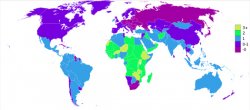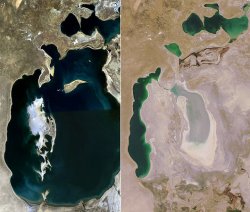Global changes
 In terms of evolution, the species Homo sapiens is extremely successful. The populations of other species that are positioned similar to us on the food chain tend to max out at about 20 million. We, by contrast, took just 120, 000 years to achieve our first billion members, and then needed only another 206 years to add 6 billion more. According to the United Nations Population Division, our population will hit 7 billion on Oct. 31, and though fertility rates have begun to decline across much of the globe, we're still projected to reach 9 billion by mid-century and level off at around 10 billion by 2100.
In terms of evolution, the species Homo sapiens is extremely successful. The populations of other species that are positioned similar to us on the food chain tend to max out at about 20 million. We, by contrast, took just 120, 000 years to achieve our first billion members, and then needed only another 206 years to add 6 billion more. According to the United Nations Population Division, our population will hit 7 billion on Oct. 31, and though fertility rates have begun to decline across much of the globe, we're still projected to reach 9 billion by mid-century and level off at around 10 billion by 2100.
A panel of academics met at Columbia University's Earth Institute on Monday (Oct. 17) to discuss the impacts of the human population explosion, including the ways in which it will change the face of the Earth this century. Here are five striking changes you — or your kids or grandkids — can expect to see.
Annual population percent change in the world based on data from the 2011 CIA World Factbook.
Credit: Public domain
Currently, it's a well-known fact that China is the most populous country in the world, and that Africa, though riddled with problems, is not necessarily overpopulated considering its size. These facts will drastically change. China's one-child policy has significantly curbed its growth, while in some African countries, the average woman gives birth to more than 7 children. [How Many People Can Earth Support?]
 According to Joel Cohen, a population biologist at Columbia University and the keynote speaker at Monday's conference, India's population will overtake China's around 2020, and sub-Saharan Africa's will overtake India's by 2040. Furthermore, "In 1950, there were three times as many Europeans as sub-Saharan Africans. By 2100, there will be five sub-Saharan Africans for every European. That's a 15-fold change in the ratio, " Cohen said. "Could you imagine that that might have an impact, geopolitically and on international migration?"
According to Joel Cohen, a population biologist at Columbia University and the keynote speaker at Monday's conference, India's population will overtake China's around 2020, and sub-Saharan Africa's will overtake India's by 2040. Furthermore, "In 1950, there were three times as many Europeans as sub-Saharan Africans. By 2100, there will be five sub-Saharan Africans for every European. That's a 15-fold change in the ratio, " Cohen said. "Could you imagine that that might have an impact, geopolitically and on international migration?"
 Jean-Marie Guehenno, former UN Under-Secretary General for Peacekeeping Operations and director of the Center for International Conflict Resolution at Columbia University's School of International and Public Affairs, said the migration of people from Africa to Europe will present a major challenge in the near future. "You can look at it as an enormous potential from a European standpoint … or you can say, '[Africa] is a continent that still has 15 percent that are not going to school, ' and that can be seen as a threat, " Guehenno said. "How are you going to manage that immigration so that this aging continent of Europe benefits from it while managing it? That is going to be a huge question."
Jean-Marie Guehenno, former UN Under-Secretary General for Peacekeeping Operations and director of the Center for International Conflict Resolution at Columbia University's School of International and Public Affairs, said the migration of people from Africa to Europe will present a major challenge in the near future. "You can look at it as an enormous potential from a European standpoint … or you can say, '[Africa] is a continent that still has 15 percent that are not going to school, ' and that can be seen as a threat, " Guehenno said. "How are you going to manage that immigration so that this aging continent of Europe benefits from it while managing it? That is going to be a huge question."



 The PAGES (Past Global Changes) project is an international effort to coordinate and promote past global change research.
The PAGES (Past Global Changes) project is an international effort to coordinate and promote past global change research.